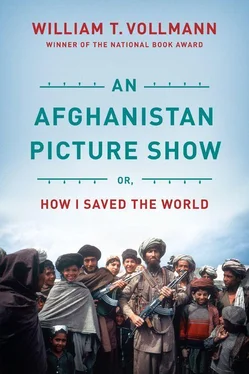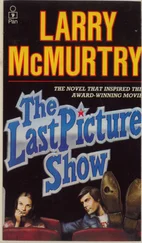The Young Man watched the red light and the steady green light on his tape recorder.
“So they go to village,” the waiter said. “They kill the womans. I saw one woman, they kill her, the Russian soldier shoot and she die … I was in the village with my grandfather; I was there when the Roos attacked. With tanks they attacked our village, and we ran away to the mountains.
Another woman there, she started to fight back; she climbed on the roof of the tank, and at last one soldier with Kalashnikov kill her, like that”—he made a machine-gunning noise—“she fall down; she was young , and she died in that time. She was a very brave girl. Still she had not married. And she died. — And there was two other old person, do you know, seventy years old, sixty years old; we all us ran away to the mountains, and also the womans, but these two, three old persons, they think the Russians never do anything with them; they are older!” —He laughed. — “One of them carries something with his donkey. But the Russian soldiers came. Before they ask him, ‘What are you doing? What do you have?’ they kill him, by God, and the other one also.
“And after this time,” the waiter said, “we have many problem in the village, because all the womans they cannot run for two, three hours; they are very tired. We make the underground place, and we have a soldier in the first street, and when the Russians attack he run for us and inform to us, ‘The Russian soldiers coming!’; then all the girls and womans go underground, and the young boys shooted against the Russian, and they run away; sometimes they kill many Russian soldiers. But one problem was that we did not have many guns and other things.
“At that time my father was in the city, in Kabul, and also my brother and my sisters, and I decided to come here. The village was damaged. I couldn’t go back to the city: the policemen was there, and they put my father in jail for two, three weeks for us. They say to him, ‘Where is your children; where is your sons? They are young, so they must be soldier!’ jBut my father refused that he didn’t know anything, so finally they released him; and I came here to the Pakistan, and my brother and my father and my mother and my sisters also came here; and that is the story of my life.”
There was a silence for a moment, and the waiter leaned back, shredding invisible things in his hands. “Once,” he said, “I talk with Russian soldiers the first time they get off airplane. They told me, ‘We are here to help you, but you kill us! I want to fight with China and Pakistan people.’ —I say, ‘You didn’t come to Afghanistan to help Afghan people; you came to kill them and make trouble. Go back to your country. Don’t fight against people.’ —They say, ‘Are you bandit? Why are you talking opposite of your country?’ ”
“Abdul!” called the men at the other table. “Fanta, Sprite, Sprite!”
“I have one uncle, he was twenty-three years old,” the waiter said. “He completed his studies, but he didn’t work. They caught him; they make him soldier. After two, three weeks he die; they kill him.” —He laughed and got up and served the men at the other table a Fanta and two Sprites, in cool wet bottles. The fans roared.
A QUESTION
“When I imagine that someone who is laughing is really in pain I don’t imagine any pain-behaviour, for I see just the opposite. So what do I imagine?” k
HELPLESSNESS [3]
At last the waiter came back and looked at the Young Man questioningly. So many people had looked at the Young Man full in the face with pleading glowing in their eyes, so desperate to be saved that they forced themselves to believe in him; but the waiter expected only one thing: that in the space of a few months he must go with his family to the camps. His gaze of questioning was meant only to be courteous—“What else would you like to ask me?” —but to the Young Man it seemed a different kind of question that filled him with fear and sadness.
“What is life like for you here?” said the Young Man, striving instinctively to propitiate that soul that had not been wronged by him, could not be propitiated by him, could not be propitiated by anything that was likely to happen (for six years later, as I wrote this, nine years after the invasion, the Russians were still in Afghanistan, and the year after that there was only chaos).
“Refugee is very bad life,” the waiter shrugged.
HAPPINESS [4]
“If you had a message for the Americans, what would it be?”
“All the young boys from the camps,” said the waiter, “they are fighting against the Roos . There is no difference between Mujahid and refugee; my father and I are refugee and Mujahid … lIf Americans help us, we want to be helped as Mujahids. It is more important to give ammunition; then we will be able to fight bravely against the Russians. The second is food; food is very important, and medicine.”
“And no help specifically for the refugees?”
“Many refugees in America, they have sponsorship and the rich people,” the waiter said. “At the embassy in Islamabad they told me, ‘Have you a sponsor?’ and I told them no. ‘Then you don’t have a chance,’ they say. I asked them, ‘Why you help only special people?’ ”
It did not seem to the Young Man that the waiter had answered his question. He sat waiting until for the second time the waiter looked him full in the face and said, “Nothing will help refugees. But send us just one atom bomb and we will be happy forever.” And he laughed.

Gunshot wound
* Allah permitting.
† Asalamu alaykum : Peace be upon you. — Walaykum asalam : And upon you, peace.
‡ Thank you very much.
§ “Please send me material on Anti-Jamming as well as Electronic Counter measures …,” the General wrote him in 1984. But the poor Young Man, try as he would, could find out scarcely anything about this subject. He did not have the right connections.
‖ Yusuf Ali was certain that all the boys in America touched each other. “Have you ever touched another boy?” he asked. “No? Very good. You are a pure, gentle boy.”
a Probably this is why doctors so often seem callous to those who do not have to do their work. Beset with a flood of suffering and dying, they must accept the fact that they can make almost no difference. Good doctors, of course, only work that much harder.
b “Professor E— B—, the judge for this year’s B— Prize in Political Science, asked me to convey to you his admiration for the work,” wrote the administrative assistant. “Although not really ‘political science,’ as literature it is splendid.” —A literary agent thought that it had some good political insights, although it did not stand up as literature.
c In 1982, someone told me that an American dollar was worth the equivalent of ten dollars to a Pakistani, and a hundred dollars to an Afghan.
d INTERARMSGram: May 8, 1984
Mr. William T. Vollmann
San Francisco, CA 94122
Dear Mr. Vollmann:
We thank you for your inquiry and request for quotations on anti-aircraft missiles and launchers. We are sorry to inform you that we are unable to be of assistance on these items as we do not handle this type of armament.
Very truly yours,
Carl Ring
Vice President
CR: smc
INTERARMS · NUMBER TEN PRINCE STREET · ALEXANDRIA, VIRGINIA 22313
e “To Wm. Vollmann the PRESIDENT of Afghanistan Media Committee: We the Revolutionary Community Party of America condemn your rightwing propaganda. We will fight your death propaganda by whatever means necessary.”
Читать дальше













